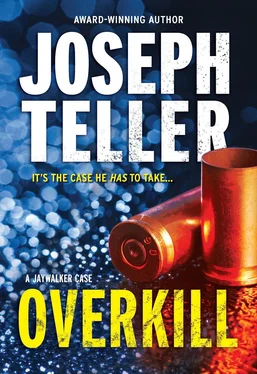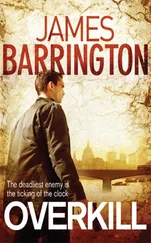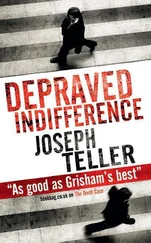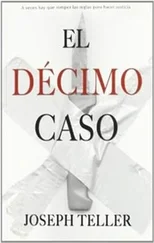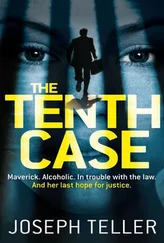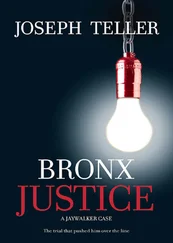Joseph Teller - Overkill
Здесь есть возможность читать онлайн «Joseph Teller - Overkill» — ознакомительный отрывок электронной книги совершенно бесплатно, а после прочтения отрывка купить полную версию. В некоторых случаях можно слушать аудио, скачать через торрент в формате fb2 и присутствует краткое содержание. Жанр: Криминальный детектив, на английском языке. Описание произведения, (предисловие) а так же отзывы посетителей доступны на портале библиотеки ЛибКат.
- Название:Overkill
- Автор:
- Жанр:
- Год:неизвестен
- ISBN:нет данных
- Рейтинг книги:3 / 5. Голосов: 1
-
Избранное:Добавить в избранное
- Отзывы:
-
Ваша оценка:
- 60
- 1
- 2
- 3
- 4
- 5
Overkill: краткое содержание, описание и аннотация
Предлагаем к чтению аннотацию, описание, краткое содержание или предисловие (зависит от того, что написал сам автор книги «Overkill»). Если вы не нашли необходимую информацию о книге — напишите в комментариях, мы постараемся отыскать её.
Overkill — читать онлайн ознакомительный отрывок
Ниже представлен текст книги, разбитый по страницам. Система сохранения места последней прочитанной страницы, позволяет с удобством читать онлайн бесплатно книгу «Overkill», без необходимости каждый раз заново искать на чём Вы остановились. Поставьте закладку, и сможете в любой момент перейти на страницу, на которой закончили чтение.
Интервал:
Закладка:
Unless Victor Quinones had been tanking up on gasoline additives, the presence of ethanol meant he’d been drinking. And opiates would be heroin.
“How much ethanol?” he asked.
“Let me see. Point one one.”
“And the opiates?”
“Not quantified,” she said.
“Didn’t this thing happen in the morning?” Jaywalker asked. He knew the answer, of course. The witnesses had placed the shooting at a few minutes after 11:00 a.m.
“The victim was pronounced at twelve-fifteen in the afternoon. And they didn’t take samples until the autopsy, which was conducted the next day.”
She was right, technically. According to the death certificate, which Jaywalker had also committed to memory some time ago, Quinones hadn’t been officially pronounced dead until an hour after the shooting, at the hospital. And the autopsy hadn’t been performed until the following afternoon. But none of that mattered. Death had a funny way of bringing the body’s metabolism to a screeching halt. If Victor had had a.11 reading lying on the morgue table, he’d had the same exact reading when he’d taken a bullet between the eyes some thirty hours earlier. A.11 meant eleven hundredths of a percentage point of alcohol in his system, by weight. It might not have sounded like much to a layman, but to Jaywalker it translated out to roughly five drinks, all of them knocked back well before noon. Enough to place him over the limit for driving and into the category of legally intoxicated. And that was before you even started talking about the undetermined amount of heroin he’d had in his system.
“Nice breakfast,” said Jaywalker.
Over the weeks that followed, he spent three full days rereading the crime-scene reports, the ballistics findings and the autopsy protocol. When the serology and toxicology reports showed up in the mail, he read those, too, even though he’d already had Katherine Darcy read them to him over the phone two days earlier. He revisited the crime scene, taking more measurements and snapping more photos than he had the last time he’d been there.
He had Jeremy brought over to 10 °Centre Street for a dozen more counsel visits, each time probing for greater detail about both the months leading up to the fatal day and the events of that day itself. The process continued to feel like dentistry, but over time Jeremy gradually became a more cooperative patient. Where he’d once dug in and resisted every inch of the way, he now finally began to let go of his secrets. Not happily, and certainly not easily. But with Jaywalker constantly reminding him how important it was to their chances at trial, Jeremy finally demonstrated that he got it, that he made the connection between his providing sufficient detail and a jury believing what he was telling them. Still, it continued to be a painstaking process, as well as one that promised to continue right up to the minute the young man would finally take the witness stand.
Jaywalker met twice more with Jeremy’s mother and his twin sister, Julie, pushing them to tell him again about the changes they’d noticed in Jeremy over the course of the summer of the “problem.” After the second session, he was already on his feet, gathering up his papers and stuffing them back into his briefcase, having politely but firmly resisted Carmen’s insistence that he take home some pork, rice and beans in a “dog bag,” when she stopped him.
“Oh,” she said. “I almost forgot to tell jew.”
“Forgot what?”
“She called.”
“She?”
“The girl,” said Carmen. “The girl, Miranda. She called, just like I told her mother she had to do.”
Jaywalker sat back down. His instructions had actually been for Miranda to call him. But this was a start, at least. “And?” he said.
“And they’re coming to New Jork. In January they’re coming.”
“To stay?”
“No,” said Carmen. “Just for a weekend. There’s a wedding. A uncle of the girl’s is getting married. Her mother’s brother, I think. So I told her she gotta talk to jew.”
“And?”
“And that’s it. I told her she gotta talk to jew. That means she gotta talk to jew. Right?”
And all Jaywalker could think to say in return was, “Right.”
And finally, when he’d run out of other things to do, he hit the books. Doing legal research had never been Jaywalker’s favorite pastime, but as much as he tended to put it off, he knew it was an indispensable part of his job.
He started with the Penal Law and the Criminal Procedure Law, the twin bibles of the New York criminal law practitioner. He read and reread the relevant sections on justification, physical force, deadly physical force and extreme emotional disturbance until he knew them by heart. From there he moved on to the case law, the written opinions of appellate judges in which they’d interpreted the statutes and measured them against specific fact patterns presented by actual cases. He searched for key words and phrases that might apply to the facts of his own case.
Suppose the jury were to find that Jeremy, and not Victor Quinones, had been the initial aggressor? Did that finding strip the defense of its claim of justification? Had Jeremy been under a duty to retreat, to run from Victor? Did justification end at the point when Victor lay on his back, begging for mercy? Did Jeremy’s perception that his life was in immediate danger have to be a reasonable appraisal of the facts? If so, was the test of reasonableness an objective one or a subjective one? In other words, were Jeremy’s actions to be measured against the standard of what a reasonable person should have done under the circumstances, or of a person who’d been through everything Jeremy had been through? Suppose, for example, that Jeremy’s perception had been severely distorted by the events of the summer and of the day of the fight? Could that distortion be considered? Were the jurors to act as cold, detached, impassionate judges of the facts? Or were they supposed to somehow place themselves in Jeremy’s shoes and try to see things as he’d seen them?
And who had to prove what? Justification, it turned out, was defined as a defense, so once it was raised, the prosecution bore the burden of proving its absence . But extreme emotional disturbance was an affirmative defense, meaning Jaywalker would have to prove its existence.
But prove to what standard? While the lack of justification had to be proved by the prosecution beyond a reasonable doubt, the presence of extreme emotional disturbance could be proved by the defense with a mere preponderance of the evidence.
But offsetting that important advantage for the defense was the far more significant one that favored the prosecution. Justification was a complete defense, requiring a jury to acquit a defendant altogether. Extreme emotional disturbance, on the other hand, was only a partial defense, reducing the offense from murder to first-degree manslaughter. It still left a defendant exposed to a twenty-five year sentence, a twenty-five year sentence that Harold Wexler had promised in no uncertain terms to Jeremy Estrada, even if Jaywalker were to succeed in knocking out the murder count.
He went to bed dizzy and exhausted, with statutes and cases spinning wildly in his head, knowing that with sleep would come nightmares of being shot between the eyes and left to bleed out on the pavement. Seven nights in a row he went to bed like that. But by the end of the week there was no one in the universe who understood the principles, permutations and nuances of justification and extreme emotional disturbance half as well as Jaywalker did.
With the possible exception of Harold Wexler.
8
They went back to court just before Thanksgiving. When Jaywalker indicated that Jeremy still had no interest in a manslaughter plea and a twenty-five year sentence, Harold Wexler could barely conceal his irritation.
Читать дальшеИнтервал:
Закладка:
Похожие книги на «Overkill»
Представляем Вашему вниманию похожие книги на «Overkill» списком для выбора. Мы отобрали схожую по названию и смыслу литературу в надежде предоставить читателям больше вариантов отыскать новые, интересные, ещё непрочитанные произведения.
Обсуждение, отзывы о книге «Overkill» и просто собственные мнения читателей. Оставьте ваши комментарии, напишите, что Вы думаете о произведении, его смысле или главных героях. Укажите что конкретно понравилось, а что нет, и почему Вы так считаете.
